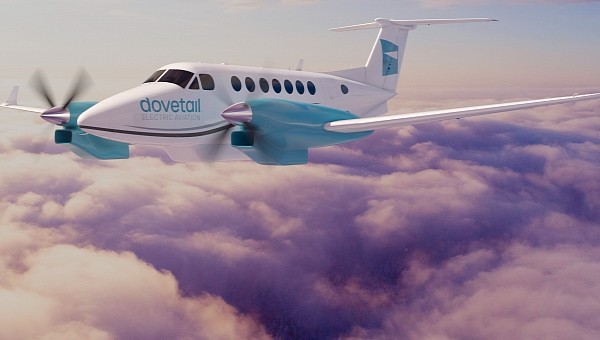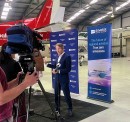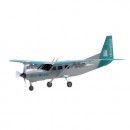As exciting as all-new electric boats and electric aircraft might be, there’s hardly enough of them to have a powerful impact on reducing the emission levels of current commercial aviation and boating. Waiting around until brand-new electric fleets are ready to replace the old ones is simply not feasible. One of the ways to accelerate the transformation of commercial flights is to convert existing aircraft – not only efficient, but also more sustainable.
It’s going to take years before all-new electric aircraft such as Eviation’s Alice can be easily available and accessible (money-wise) for all commercial operators around the world. Until then, a more practical approach is to fit so-called legacy aircraft with battery-electric propulsion system, or even hydrogen-electric ones.
Perhaps the most talked-about project of this kind is ZeroAvia, which is developing its own hydrogen powertrains.
In Australia, another project is trying to achieve something similar. Sydney Aviation Holdings joined forces with the Spanish Dante Aeronautical a while back, to establish a joint venture now known as Dovetail.
Dovetail claims that it will succeed in eliminating one million tonnes of CO2 (the equivalent of 2% of the regional aviation emissions around the world) after just five years of operation. The way to do that? By converting fuel-burning aircraft to 100% electric propulsion.
The Australian company plans to provide to its future customers both battery-powered Cessna Caravan aircraft (for cargo operations) and hydrogen-electric Beechcraft King Air aircraft, for passenger transportation.
It has already secured important partners for its project, such as Rex Airline (one of the biggest in Australia, which will supply the King Air that will be used as a hydrogen testbed), Volotea, Air Nostrum, and Monte.
Another key partner is magniX, one of the experts in developing electric propulsion systems for aviation. magniX claims that its EPUs (electric propulsion units) are the only ones on the market in the 350 kW to MW class that have been flight-tested. And they are also compatible with hydrogen technology.
In addition to having already secured the first customers for its future electric aircraft conversions, Dovetail was recently awarded a multi-million dollar grant by the Federal government. It was one of the 19 companies that received funding through this Co-operative Research Centre Project Grant program, supported by the Department for Industry and Science.
The funds for this research project will basically be used to get the conversion process for turboprop airplanes from development to certification. The resulting aircraft will be used for regional commuter services. According to Rex Airlines, this could help reduce operational costs by up to 40%.
The young Australian company hopes to achieve certification for its battery-electric Caravan conversion by 2025, soon to be followed by the hydrogen-electric King Air conversions.
Perhaps the most talked-about project of this kind is ZeroAvia, which is developing its own hydrogen powertrains.
In Australia, another project is trying to achieve something similar. Sydney Aviation Holdings joined forces with the Spanish Dante Aeronautical a while back, to establish a joint venture now known as Dovetail.
Dovetail claims that it will succeed in eliminating one million tonnes of CO2 (the equivalent of 2% of the regional aviation emissions around the world) after just five years of operation. The way to do that? By converting fuel-burning aircraft to 100% electric propulsion.
The Australian company plans to provide to its future customers both battery-powered Cessna Caravan aircraft (for cargo operations) and hydrogen-electric Beechcraft King Air aircraft, for passenger transportation.
It has already secured important partners for its project, such as Rex Airline (one of the biggest in Australia, which will supply the King Air that will be used as a hydrogen testbed), Volotea, Air Nostrum, and Monte.
Another key partner is magniX, one of the experts in developing electric propulsion systems for aviation. magniX claims that its EPUs (electric propulsion units) are the only ones on the market in the 350 kW to MW class that have been flight-tested. And they are also compatible with hydrogen technology.
In addition to having already secured the first customers for its future electric aircraft conversions, Dovetail was recently awarded a multi-million dollar grant by the Federal government. It was one of the 19 companies that received funding through this Co-operative Research Centre Project Grant program, supported by the Department for Industry and Science.
The funds for this research project will basically be used to get the conversion process for turboprop airplanes from development to certification. The resulting aircraft will be used for regional commuter services. According to Rex Airlines, this could help reduce operational costs by up to 40%.
The young Australian company hopes to achieve certification for its battery-electric Caravan conversion by 2025, soon to be followed by the hydrogen-electric King Air conversions.





